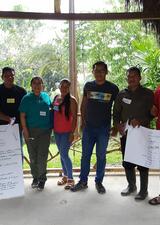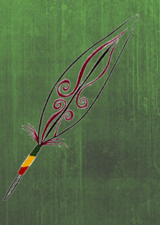Welcome

Our Mission & Indigenization Policy
The JISD is dedicated to improving practice and expanding knowledge relevant to Indigenous peoples’ social, cultural economic, and environmental wellbeing worldwide. The mission of JISD is to advance knowledge and understanding of:
- Indigenous peoples’ efforts to preserve, defend, and promote their life ways, knowledges, and values;
- Social development, as processes of resurgence, and/or social change, that improves individual, family, community, and cultural wellbeing so that all involved are supported to reach their full potential;
- Effective and promising social support and development practices (traditional and contemporary) with individuals, families, communities, and/or societies that create sustainability options in a changing world;
- How qualitative changes in the structures and frameworks of societies can improve Indigenous wellbeing of individuals, families, communities, and/or societies;
- Critical analyses of social barriers, challenges, and oppressions, and the progressive alternatives that support Indigenous peoples, families, and individuals facing these barriers, challenges, and oppressions; and
- Research, particularly research based in Indigenous methodologies, that supports the social, cultural, economic and environmental wellbeing of Indigenous peoples and which may come from a range of bases, including science, business, the arts, health care, education, policy, technology, and government.
Indigenization Policy
The Journal of Indigenous Social Development (JISD) assumes that scholars, researchers, educators, and practitioners submitting manuscripts of their work with Indigenous communities utilize respectful, ethical, decolonizing methods[1]. To prevent re-colonization or cultural appropriation, JISD requires that authors substantiate their relationship to the specific Indigenous group written about. Whenever possible Indigenous practitioners, scholars, or individuals who directly participated in the study or provided information toward its development should be included as first authors, co-authors, or credited for their contributions. A few sentences in the introduction or abstract, clearly addressing these areas will assist the review process.
[1] Ethical and decolonizing research involves accepting and trusting cultural protocol processes, transcending one’s own perspectives, acknowledging, and respecting different meanings and ways of being (Harvey (2003).
A Word from our Editor
The publication of the Journal of Indigenous Social Development is part of a larger process and continuum that brings to light new paradigms and conceptions of Indigenous social work, social welfare and social development practice and research. The process began with the first International Indigenous Voices in Social Work conference in Makaha, Hawaiʻi in 2007. The gathering of Indigenous social workers from regions throughout the Pacific and North America was timely given the mounting interest regionally and globally. This conference reflected how Indigenous social workers were emphasizing the need for incorporating Indigenous ideas and practices into social work.
Indigenous peoples understand how the colonial conceptualization of social work, social welfare, and social development threatens not only Indigenous peoples, but the social well-being of all people and their wholistic relationships with their environments. These threats emphasize ideas and practices based on the separation of people from their histories, cultural understandings, and practices as well as the disconnection of people from their lands, waters, skies, and generations to come. These critical understandings have been expressed in the ongoing International Indigenous Voices in Social Work Conferences that have taken place in Winnipeg, Canada, Darwin, Australia and Alta, Norway. In these conferences, Indigenous peoples working in social work, social welfare, and/or social development have emphasized alternative ways forward.
With a commitment to local knowledges that have intergenerational and/or community bases, Indigenous peoples have focused on the resurgence of their traditional and cultural practices. They have also incorporated ideas and practices from one another’s societies and developed them to fit their needs, aspirations, and visions locally. Despite the ongoing colonial oppression that ranges from insidious impositions to the overt killings of Indigenous people, there is a continuing resurgence of Indigenous peoples’ knowledges, values, practices, and visions by Indigenous peoples active in social work, social welfare, and social development. This resurgence is evident in each issue of this journal.
Individuals from various communities throughout the world have sought out the Journal of Indigenous Social Development as a place to publish their anti-colonial, Indigenist work. While a notable number of the publications have come from individuals in academia, there are also voices from Indigenous authors working in communities and organizations. Overall, the publications reflect the intent of the journal to support the push back on colonialism and the centering of Indigenous philosophies, values, perspectives, and practices for Indigenous peoples.
Our vision is to rally the collective intelligence and passions of scholars, researchers, and practitioners committed to Indigenous social work, social welfare, and social development into a productive, less derivative, more dignified approach to supporting Indigenous communities in their self-determining efforts. Perhaps it may offer a template for something new in the world.
The Journal was originally published through Le’a Publications which was established through a generous gift from Sally Lampson Kanehe (MSW). Her passion for the creation and dissemination of Indigenous knowledge is vital to the profession of social work and the wellbeing of the people to whom she is deeply committed. It had continued through the support of the University of Manitoba, Faculty of Social Work, and the Canada Research Chair program. It is now supported through the Faculty of Social Work at the University of Calgary in Alberta, Canada. Moreover, its continuing success is due to the effort and commitment of Indigenous peoples globally as they stand strong for their ways of being and place in the world.
Michael Anthony Hart

Honouring the life of Sally Lampson Kanehe
We would like to honour the vision, generosity, and commitment of Sally Lampson Kanehe (MSW), who, through a generous gift, was the catalyst in the publication of the Journal of Indigenous Social Development (JISD). This journal is only one of the many contributions she has made to the betterment of humanity, we are grateful for our connection to her legacy. Please read more here.

Author Spotlight:
Dr. Veronica Santafe-Troncoso is a sessional instructor and postdoctoral associate at the University of Calgary. She moved to Canada eight years ago from her home country of Ecuador to study at the University of Saskatchewan in the School of Environment and Sustainability with her research focused on Food Sovereignty and Indigenous Tourism her article is in the most recent issue of JISD and shares the experience, knowledge and research she did which used art journalling and culturally appropriate research methods.

News & Events
International Indigenous
November 13-17, 2023. Online. More info...
NAISA 2024
June 6-8, 2024. Norway. More info...
Indigenous Health Conference 2024
Follow for updates. More info...


Vol. 11 No. 1 (2022)
Click here for the latest issue.

Past Issues
Click here for past issues

Follow us on Social Media

Submit an Article
To submit an article click here. You must register as a user and login to start the submission process. We look forward to reviewing your submission!
Meet the Editorial Board
Keep in Contact
If you would like to be notified when the latest issues are published please submit your name and contact information to jisd@ucalgary.ca.
